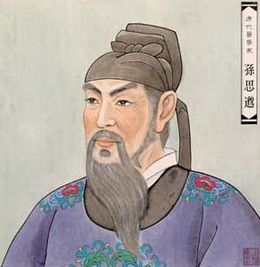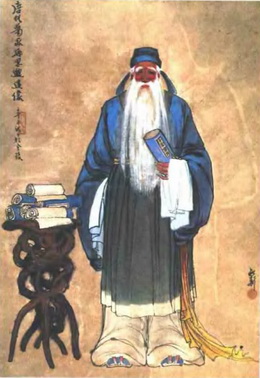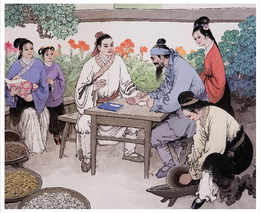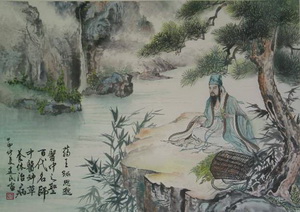Sun Simiao: Biographical introduction and legendary stories, major works and academic contributions
-
 ✵孫思邈 (Sūn Sīmiǎo) was a prominent physician who lived during the Sui and the Tang Dynasties. He was from Hua Yuan in Jing Zhao. At the age of 19, Sun began studying medicine, aiming to "know it with enlightenment and understanding" and help many patients among his relatives and neighbors. By the time he was 20 years old, Sun could talk about the theories of Laotze and Chuang Tzu with fervor and assurance, and he was well-versed in classical books of Taoism. Sun Simiao held the precious treatment of morality in ancient times, emphasizing the importance of life. He proposed that "a man's life is the most important, and is more valuable than 5 kg of gold, one recipe for help, and morality is more important than saving."
✵孫思邈 (Sūn Sīmiǎo) was a prominent physician who lived during the Sui and the Tang Dynasties. He was from Hua Yuan in Jing Zhao. At the age of 19, Sun began studying medicine, aiming to "know it with enlightenment and understanding" and help many patients among his relatives and neighbors. By the time he was 20 years old, Sun could talk about the theories of Laotze and Chuang Tzu with fervor and assurance, and he was well-versed in classical books of Taoism. Sun Simiao held the precious treatment of morality in ancient times, emphasizing the importance of life. He proposed that "a man's life is the most important, and is more valuable than 5 kg of gold, one recipe for help, and morality is more important than saving."
- 孫思邈 (Sūn Sīmiǎo).
-
Brief Introduction Chinese Name: 孫思邈 (Sūn Sīmiǎo) Alias: 孫十常 (Sūn Shícháng) Popular name: 妙應真人 (Miào Yīng Zhēn Rén) English Name: Sun Simiao, or Simiao Sun (Given/Sur Name) Hometown: Hua Yuan Dates: about 518 or 541–682 A.D. Main works: 《老子疏註》(Lao-tzu Shu Zhu, or Annotation on Lao-Tzu), 《莊子疏註》(Chuang Tzu Shu Zhu, or Annotation on Chuang Tzu),《枕中記》(Zhen Zhong Ji, or Records in the Pillow),《千金要方》(Qian Jin Yao Fang, or the Invaluable Prescriptions),《會三教論》(Hui San Jiao Lun, or Thesis on the Three Religions),《福祿論》(Fu Lu Lun, or On Fortune),《千金翼方》(Qian Jin Yi Fang, or the Supplement to the Invaluable Prescriptions), etc. Representative works: 《千金要方》(Qian Jin Yao Fang, or Invaluable Prescriptions),《千金翼方》(Qian Jin Yi Fang, or Supplement to the Invaluable Prescriptions) Biographical introduction and legendary stories
 Sun Simiao (518 or 541–682 A.D.) was a prominent herbalist and Taoist priest who lived during the Sui and Tang Dynasties. He was from Hua Yuan in Jing Zhao. He had loved reading books since childhood. He was very wise from a young age; by the age of seven, he could read over one thousand Chinese characters and recite articles of over one thousand characters every day. According to the ancient book Chiu Tang Shu (The Old Book of Tang), the West Wei minister Dugu Xin thought highly of Sun and called him "the saint child". At 19 years old, Sun aimed to study medicine, "knowing it with enlightenment and understanding, helping many patients among relatives and neighbors." By the time he was 20 years old, Sun could talk about the theories of Laotze and Chuang Tzu with fervor and assurance. He was well-versed in the classical books of Taoism and was called "the Holy Kid" by the locals. He began treating the diseases of the people around him.
Sun Simiao (518 or 541–682 A.D.) was a prominent herbalist and Taoist priest who lived during the Sui and Tang Dynasties. He was from Hua Yuan in Jing Zhao. He had loved reading books since childhood. He was very wise from a young age; by the age of seven, he could read over one thousand Chinese characters and recite articles of over one thousand characters every day. According to the ancient book Chiu Tang Shu (The Old Book of Tang), the West Wei minister Dugu Xin thought highly of Sun and called him "the saint child". At 19 years old, Sun aimed to study medicine, "knowing it with enlightenment and understanding, helping many patients among relatives and neighbors." By the time he was 20 years old, Sun could talk about the theories of Laotze and Chuang Tzu with fervor and assurance. He was well-versed in the classical books of Taoism and was called "the Holy Kid" by the locals. He began treating the diseases of the people around him.
In the first year of the Kai Huang era (581 A.D., Kai Huang is the reign title of Yang Jian, the Wen Di Emperor of the Sui Dynasty), Sun Simiao began living in the Tai Bai Mountain. There, he studied medical books, collected herbs by himself, carefully read ancient books, widely collected popular herb recipes, warmheartedly helped patients, and accumulated many precious experiences.
 Sun Simiao was a renowned Taoist priest and scholar of Taoism. A true scholar, he began studying herbs at a young age. He stated: "I have suffered from colds and chills since childhood and have consulted herbalists many times. To pay for medicine, I nearly exhausted our family's property," and he "started to become well-versed in medicine at age 20 and helped neighbors who were suffering from disease."
Sun Simiao was a renowned Taoist priest and scholar of Taoism. A true scholar, he began studying herbs at a young age. He stated: "I have suffered from colds and chills since childhood and have consulted herbalists many times. To pay for medicine, I nearly exhausted our family's property," and he "started to become well-versed in medicine at age 20 and helped neighbors who were suffering from disease."
When the Sui Dynasty ended, Sun Simiao became a hermit and moved to Zhongnan Mountain, where he befriended monk Dao Xuan (596–667 A.D.). According to ancient literature, he still looked like a young man in his 70s. The literature stated that "During the Tang Dynasty's Wu De years (618–626 A.D.), Sun Simiao came to the capital by imperial edict from Taizong of Tang (Li Shimin, the second emperor of the Tang Dynasty). When Tang Taizong saw the herbalist, he was surprised by his youthful appearance and asked how he had achieved it. The emperor showed his respect by offering Sun Simiao a noble rank, which the herbalist refused." In 674 A.D., Sun returned to the mountains with the cause of sickness. Sun was a true scholar who spent his life helping patients in the mountains.Major works and academic contributions
Sun Simiao is the author of the book Qian Jin Yao Fang (the Invaluable Prescriptions) (652 A.D.), a 30-volume book containing 5,300 herbal recipes and formulas, and the book Qian Jin Yi Fang (the Supplement to the Invaluable Prescriptions) (682 A.D.), a book considered a compilation of medical achievements before the 7th century. In addition to these famous books, Sun compiled other books, such as She Yang Zhen Zhong Fang (the Health Cultivation Pillow Prescriptions), Fu Lu Lun (On Fortune), Bao Sheng Ming (Inscription about health-preserving), Cun Shen Lian Qi Ming, etc.
According to the ancient book Jiu Tang Shu (the Old Book of Tang), Sun wrote "Lao-tzu Zhu (Annotation on Lao-Tzu), Chuang Tzu Zhu (Annotation on Chuang Tzu), wrote Qian Jin Fang (the Invaluable Prescriptions) in 30 volumes, Fu Lu Lun (On Good Fortunes) in three volumes, She Sheng Zhen Lu (the True Records on Health Regimen), Zhen Zhong Su Shu (the Plain Book in the Pillow), Hui San Jiao Lun (Thesis on the Three Religions) in one volume each." Unfortunately, his books, Lao-tzu Zhu (Annotation on Lao-Tzu) and Chuang Tzu Zhu (Annotation on Chuang Tzu) did not survive until today.
According to the ancient book Yaozhou Zhi (the chronicles of Yao Zhou), Sun compiled the following books: "Lao-tzu Zhu (Annotation on Lao-Tzu), Chuang Tzu Zhu (Annotation on Chuang Tzu), Qian Jin Fang (Invaluable Prescriptions), 30 volumes, Qian Jin Yi Fang (Supplement to the Invaluable Prescriptions), 30 volumes, Qian Jin Sui Fang, 20 volumes, Qian Jin Yue Ling, 3 volumes, Qian Jin Yang Sheng Lun, 1 volume, Yang Xing Yan Ming Ji, 2 volumes, Yang Sheng Za Lu in 1 volume, Yang Sheng Ming Tui Ju Zhi, 1 volume, Jin Jing, 2 volumes, Shen Zhen Fang, 1 volume, Wu Zang Pang Tong Dao Yang Tu, 1 volume, Yi Jia Yao Chao, 5 volumes. The Tang Shu (the Book of Tang), Dao Cang (Daozang, or the Taoist Canon), and Tong Zhi Lue (the Outline of Universal History Treatises) also recorded over 20 books by Sun Simiao." As a famous herbalist and Taoist, he was respected by both Taoist and Confucian schools ever since. According to various history books, local chronicles, ancient books and records, Taoist patrology, medical works, tablet inscriptions, and other literary sources, over 90 works have attributed authorship to him, though many of them forged the authorship to him for his fame.
 According to identification and corrections by modern historians and biographers, there are 17 books from herbalist Sun including the following:Lao-tzu Shu Zhu (Annotation on Lao-Tzu), 9 volumes; Chuang Tzu Shu Zhu (Annotation on Chuang Tzu), 7 volumes; Qian Jin Yao Fang (Invaluable Prescriptions), 30 volumes; Qian Jin Yi Fang (Supplement to the Invaluable Prescriptions), 30 volumes; She Sheng Zhen Lu (True Records on Health Regimen), 1 volume; Fu Lu Lun (On Fortune), 3 volumes; Hui San Jiao Lun (Thesis on the Three Religions), 1 volume; Bao Sheng Ming (Inscription about Health-Preserving); Yang Sheng Ming (Inscription about health-maintenance); Cun Shen Lian Qi Ming; Si Yan Nei Dan Gu Shi; Shen Qi Yang Shen Lun; Gui Jing (Classics of Tortoise); Tai Qing Dan Jing Yao Jue; Sun Zhen Ren Dan Jing; Ming Tang Jing Tu (Graphs of the Ming Tang Jing). There are also 10 abridged editions of his works, including the following: Qian Jin Shi Zhi, 1 volume; Xuan Nv Fang Zhong Jing, 1 volume; Sun Si Miao Jin Jing, 2 volumes; Qian Jin Fang Ping Mai Pian; Qian Jin Fang Zhen Jiu You Qian Jin Yi Fang Zhen Jiu Pian; Yao Lu Zuan Yao; Se Mai Pian; Qian Jin Fang Yang Xing Pian; Yi Jia Yao Miao; Feng Yao Fang Lun; etc.
According to identification and corrections by modern historians and biographers, there are 17 books from herbalist Sun including the following:Lao-tzu Shu Zhu (Annotation on Lao-Tzu), 9 volumes; Chuang Tzu Shu Zhu (Annotation on Chuang Tzu), 7 volumes; Qian Jin Yao Fang (Invaluable Prescriptions), 30 volumes; Qian Jin Yi Fang (Supplement to the Invaluable Prescriptions), 30 volumes; She Sheng Zhen Lu (True Records on Health Regimen), 1 volume; Fu Lu Lun (On Fortune), 3 volumes; Hui San Jiao Lun (Thesis on the Three Religions), 1 volume; Bao Sheng Ming (Inscription about Health-Preserving); Yang Sheng Ming (Inscription about health-maintenance); Cun Shen Lian Qi Ming; Si Yan Nei Dan Gu Shi; Shen Qi Yang Shen Lun; Gui Jing (Classics of Tortoise); Tai Qing Dan Jing Yao Jue; Sun Zhen Ren Dan Jing; Ming Tang Jing Tu (Graphs of the Ming Tang Jing). There are also 10 abridged editions of his works, including the following: Qian Jin Shi Zhi, 1 volume; Xuan Nv Fang Zhong Jing, 1 volume; Sun Si Miao Jin Jing, 2 volumes; Qian Jin Fang Ping Mai Pian; Qian Jin Fang Zhen Jiu You Qian Jin Yi Fang Zhen Jiu Pian; Yao Lu Zuan Yao; Se Mai Pian; Qian Jin Fang Yang Xing Pian; Yi Jia Yao Miao; Feng Yao Fang Lun; etc.
Sun Simiao was skilled in internal medicine, gynecology, pediatrics, external medicine, and ENT (ear, nose, and throat medicine). He placed great importance on women's and children's health care and compiled the works Fu Ren Fang (the Prescriptions for Women) in 3 volumes, and Shao Xiao Yin Ru Fang (the Prescriptions for Young, Child, Kid and Baby) in 2 volumes, which were collected in his book Qian Jin Yao Fang (the Invaluable Prescriptions). He attached great importance to disease prevention and believed in preventing disease first and treating it with syndrome differentiation. He believed that if a person was good at health preservation, he or she could avoid disease. Sun also emphasized studying common and frequently encountered diseases, such as severe goiter, beriberi, and other diseases, providing effective prevention measures and treatments. During his time in the Taibai Mountains, he collected herbs and studied their properties. He also studied acupuncture and moxibustion. Modern scholars have calculated and summarized 24 groundbreaking achievements of Sun in the history of TCM.
 In ancient times, herbalist Sun Simiao held the precious view of morality in treatment, emphasizing the importance of life and proposed that "a man's life is more valuable than ten thousand taels of gold, one prescription to save a life surpasses all virtues, and morality is more important than skill." He suggested that a herbalist should "know widely about the origin of classical books, learn diligently without lassitude, and not listen to hearsay, and then realize that the theory of herbs has been fully mastered." Furthermore, a herbalist should "set saving as a purpose," "when a patient asks for help, one should not ask and discriminate based on social position, whether they are rich or poor, old or young, or whether they are beautiful or ugly, Chinese or non-Chinese, a wise man or an idiot. All should be treated the same, as one's closest relatives. And one should not be overcautious and indecisive, nor onsider good or bad luck for oneself. One should treat it as something precious and care for it deeply."
In ancient times, herbalist Sun Simiao held the precious view of morality in treatment, emphasizing the importance of life and proposed that "a man's life is more valuable than ten thousand taels of gold, one prescription to save a life surpasses all virtues, and morality is more important than skill." He suggested that a herbalist should "know widely about the origin of classical books, learn diligently without lassitude, and not listen to hearsay, and then realize that the theory of herbs has been fully mastered." Furthermore, a herbalist should "set saving as a purpose," "when a patient asks for help, one should not ask and discriminate based on social position, whether they are rich or poor, old or young, or whether they are beautiful or ugly, Chinese or non-Chinese, a wise man or an idiot. All should be treated the same, as one's closest relatives. And one should not be overcautious and indecisive, nor onsider good or bad luck for oneself. One should treat it as something precious and care for it deeply."
 Sun Simiao emphasized health preservation and believed it prompts longevity. He believes in the Taoism principle that "my life lies in my hands, not in the heavens." He proposed that those who are good at health preservation should take care of a taboo and take care of supplements. Then, “within a hundred years of life, they will not suffer harm before death comes." Sun is well-versed in both Taoism and Confucianism. He stated, "If a person's morality degrades, his or her lifespan will never be extended, even if he or she takes very precious pills and elixirs."
Sun Simiao emphasized health preservation and believed it prompts longevity. He believes in the Taoism principle that "my life lies in my hands, not in the heavens." He proposed that those who are good at health preservation should take care of a taboo and take care of supplements. Then, “within a hundred years of life, they will not suffer harm before death comes." Sun is well-versed in both Taoism and Confucianism. He stated, "If a person's morality degrades, his or her lifespan will never be extended, even if he or she takes very precious pills and elixirs."
References:
-
- 1.Sun Simiao: Biographical introduction and legendary stories, major works and academic contributions
- 2.Jiu Tang Shu·Lie Zhuan Di Yi Bai Si Shi Yi·Fang Ji (The Old Book of Tang·Biographies 141·Medicine, Divination, and Similar Arts), by Liu Xu
- 3.Yaozhou Zhi (the Chronicles of Yao Zhou)
